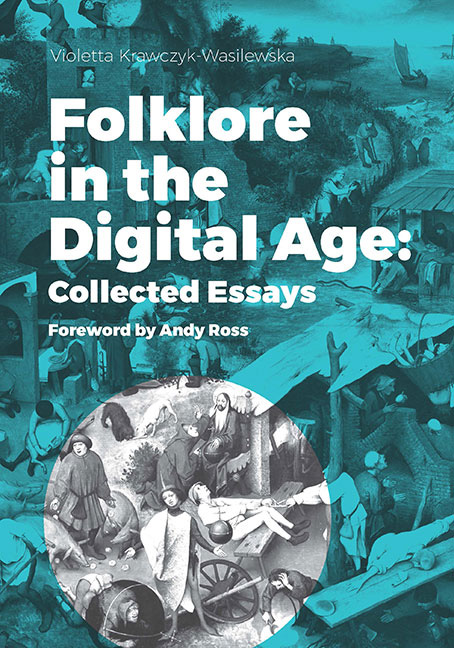Book contents
- Frontmatter
- Contents
- Acknowledgements
- Foreword
- I The Art of Bruegel and the Folklorist
- II e-Folklore as a Part of Digital Culture
- III Towards a Digital Folklore Heritage
- IV Post September 11: Global Fear vs Digital Humour
- V The Haiti Legends Revisited and the Power of e-Rumour
- VI The Global Dating Phenomenon
- VII Matchmaking through Avatars: Social Aspects of Online Dating
- VIII The Global Food Story and the Internet
- Bibliography
- Miscellaneous Endmatter
I - The Art of Bruegel and the Folklorist
Published online by Cambridge University Press: 22 December 2017
- Frontmatter
- Contents
- Acknowledgements
- Foreword
- I The Art of Bruegel and the Folklorist
- II e-Folklore as a Part of Digital Culture
- III Towards a Digital Folklore Heritage
- IV Post September 11: Global Fear vs Digital Humour
- V The Haiti Legends Revisited and the Power of e-Rumour
- VI The Global Dating Phenomenon
- VII Matchmaking through Avatars: Social Aspects of Online Dating
- VIII The Global Food Story and the Internet
- Bibliography
- Miscellaneous Endmatter
Summary
During my long career as a folklorist, I have dealt with various folklore resources. Among these were predominantly narrative genres, transmitted orally and locally, but also printed and visual versions circulated throughout Poland and Europe.
Towards the end of the 1990's and the beginning of 2000's, globally transmitted variants of electronic genres and forms began to arise, and an increasing number of primary and secondary sources became available through the Internet. The most fascinating aspect of the Internet as a database has been the possibility of studying oral and intangible heritage in a diachronic, and not merely a synchronic, way.
One day whilst browsing an Internet site, by chance, I found a ‘folkloristic’ painting known as The Netherlandish Proverbs, painted in 1559 by the Dutch Renaissance master Pieter Bruegel The Elder. Though the picture was unknown to me (perhaps because proverb is a non-narrative genre), I was familiar with a few samples of the artist's enormous iconographic heritage, especially those works called ‘peasant’ or genre paintings of ethnographic character. Remembering that his 1564 painting The Procession to Calvary inspired the 2011 Polish-Swedish co-produced drama film The Mill and the Cross, and that another of his works, Two Monkeys inspired a 1957 poem by Polish poet Wisława Szymborska, and because, needs must”, I decided to start browsing the web in search of more information about this Netherlandish painting.
Pieter Bruegel's paremiographic and iconographic masterpiece, titled Die niederlandischen Sprichworter, has been stored at the Gemaldegalerie, Berlin since 1913. This oil-on-oak-panel painting, 117 x 163 cm in size (Fig. 1), contains illustrations of over 80 Flemish proverbs, proverbial phrases and idiomatic sayings, the majority of which are still in use in many European languages (Fig. 2). Wikipedia's entry Netherlandish Proverbs has been translated into 24 (sic!) languages, each offering varying degrees of information about the painting. Fortunately, the Polish entry also includes a list of all the proverbs and idioms featured in the work, together with explanations of their meanings and where they are located (thumbnail sized fragments (Fig. 3.a, b).
- Type
- Chapter
- Information
- Folklore in the Digital Age: Collected Essays , pp. 13 - 20Publisher: Jagiellonian University PressPrint publication year: 2016



